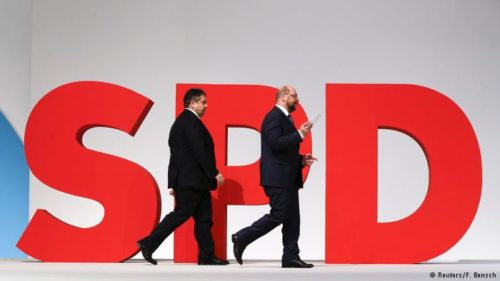Has the time of cherries passed?
The decline of European center-left
 German social democratic leaders Sigmar Gabriel and Martin Schulz
German social democratic leaders Sigmar Gabriel and Martin Schulz
In January 1996 citizens of France said a final farewell to their long-time president and socialist leader François Mitterrand. At the event on the Parisian Place de la Bastille, opera singer Barbara Hendricks sang Le Temps des cerises (The time of cherries), a song strongly associated with the socialist movement in France, that takes its roots from the Paris Commune. As the leader of French socialists, Mitterrand managed to build the Socialist party as a convincing leftist force in the environment of post-De Gaulle France. He is remembered for pursuing strong welfare state policies which are nowadays unimaginable, in a country where trade unions are historically very influential. There is also material evidence of his legacy, including the famous Louvre Pyramid, where everyone likes to take a photo while pretending to touch it.
But nowadays, what is left of his party? His successor Lionel Jospin thought he had a bad day in 2002 when he was defeated by Jean-Marie Le Pen to enter the second round with Jacques Chirac. It was the first time that the socialists experienced tactical voting against the Le Pen family. The second one was a couple of months ago. Although in France there is always a potential for the left to be a strong political influence, it seems that the French socialists have been completely torn apart between the centrist Emmanuel Macron and the far-left of Jean-Luc Mélenchon. The symbolism of selling their Paris HQ says more than enough. At the same time, their former leader François Hollande ended his mandate as the most unpopular French president, while their primary presidential candidates Manuel Valls and Benoit Hamon have already opportunistically left the party. Finally, European Commissioner Moscovici was joking after the elections that he was the only French socialist to keep his job.
In Hungary, the failure of their socialists has helped far-right Jobbik to emerge and brought Viktor Orban back to power through a two-third majority, which completely changed the political landscape of the country. The consequences are clearly visible, and not only to CEU students. It does not look good for the Austrian or Czech social democrats either, as they are also facing elections next month which they are likely to lose. This would also mean two seats less in the European Council for the social democrats. The Central European last man standing is Slovakian Prime Minister Robert Fico, but he is heavily criticized for his policies and coalition deals with the nationalists.
Probably the best-known example is Greek PASOK, through which the term Pasokification has emerged. Additionally, a member of this club is the Dutch Labour party, which suffered a record loss at the parliamentary elections in March. At the same time, their member Frans Timmermans is EU Commission deputy chief, while Jeroen Dijsselbloem is the Eurogroup President. These are reminders of a once-strong party. Something similar happened in Ireland as well, where the Irish Labour completely collapsed, largely due to coalition compromises made in the previous government.
The UK Labour party is the outlier in this trend which should not be counted here. First of all, they are still struggling through the hatred between moderate Blairites and left-wing Corbyn fans, as well as their unclear position on Brexit. However, the UK first past the post electoral system favors big parties, so it is pragmatic for them to stay together. Otherwise they will have the Tories in power forever. Secondly, Tory austerity policies, Theresa May’s significant unpopularity and her personal struggle over Brexit brought a lot of voters to Labour. Third and most important of all, the Labour party, despite everything, still lost their elections recently, making it a third loss in a row.
In Italy, elections are expected to take place sometime in the near future, with a possibility of the Democratic party failing to secure the majority. If that happens, there will be a situation that the center-left is in opposition in every of the EU founding Member State, including the Belgian left-leaning region of Wallonia.
I have left the German SPD for the end, which suffered on Sunday its worst result ever. It is a major humiliation for the oldest European social democratic party, as well as for the former European Parliament President Schulz. What went wrong? Maybe it should be a title for a book a là Hillary Clinton, but at the same time it is evident that the party did not appeal to voters, and lost them to all other parties, including CDU, FDP and AfD.
Things have changed, and the social democrats need to take a close look at themselves in the mirror if they want to survive. By forming bridges and not fostering divides on the left, by looking at the new job market challenges and providing answers to the topics of security. Who are nowadays the center-left voters, liberal middle class, students or working class? A poll stated that only around a quarter of working class voters supported the SPD. In Austria, young males tend to support the right-wing Freedom party, while the pensioners support the social democrats, remembering the golden era of Bruno Kreisky’s welfare measures. At the same time, intellectuals are spread out into liberals, greens and moderate conservatives.
Today’s political soundbites are security and migration. It is obvious that after everything that has happened in Europe over the past two years, the center-left did not bring an adequate response, or in the case of Germany, lost its identity by supporting Merkel. These are the topics that will not go away, and the social democrats need to provide answers for them or they will vanish. The only way to do it is by listening to what the people have to say, to their worries, and their concerns. At the end of the day, that is what politics is meant to be.

In the era of prosperous times for the European social democrats: Tony Blair, Lionel Jospin, Gerhard Schröder and François Hollande (Slate.fr)
